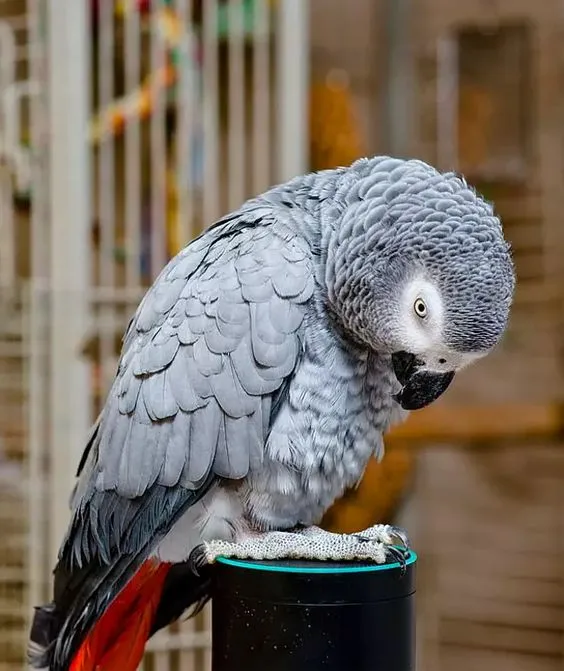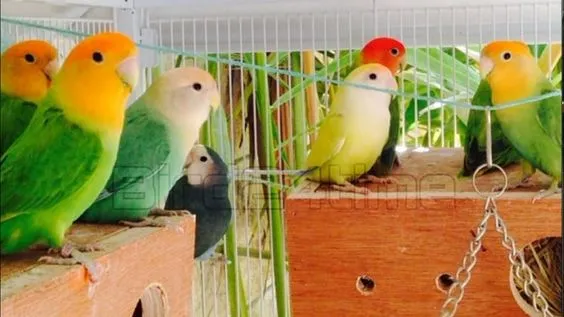Birds As Therapy And Emotional Support Pet
Birds have emerged as remarkable beings, capable of providing comfort and emotional support to individuals facing various challenges. When a bird collaborates with a trained medical professional to aid someone with a disability, it assumes the roles of an “Emotional Support Animal,” an “Assistance Animal,” or a “Therapy Animal.” It’s crucial to understand that distinct legal regulations apply to service animals, emotional support animals, and pets, each with its own set of rights and restrictions.
The Empathetic Nature of Birds
Parrots and several other bird species possess an extraordinary capacity for empathy, allowing them to keenly sense the emotional atmosphere surrounding them. They can discern stress, tension, anger, and distress in their human companions long before these emotions become overt. This innate sensitivity can be cultivated, enabling birds, like their animal counterparts, to undergo training to employ these abilities in assisting individuals dealing with psychological or emotional disabilities.
Real-Life Example: The Empathetic African Grey Parrot
Illustrating the potential of these empathetic feathered companions, there’s a remarkable case of a bipolar individual who relied on his empathetic African grey parrot. This parrot had a unique role in intuitively detecting when a rage-like episode was approaching and soothingly encouraging him to “calm down.” So deep was their connection that he equipped a cage for her with straps, transforming it into a portable companion that accompanied him wherever he went. This African grey parrot was specially trained to repeat soothing phrases and sounds, effectively serving as an emotional anchor during turbulent times.

Birds Healing Wounded Souls
Intriguingly, abused and injured parrots, residing in sanctuaries and refuges, share feelings of uncertainty and mistrust toward humans, akin to the experiences of veterans grappling with post-traumatic stress disorder. Recognizing this shared emotional landscape, various unique programs operated by charitable aviaries have harnessed the therapeutic potential of these avian companions to facilitate mutual healing between veterans and wounded birds. Moreover, the gentle and focused nature of interacting with birds has found application in diverse settings, including therapy, prison rehabilitation programs, and nursing homes, offering solace and promoting emotional well-being.
Gifted Wings Ministry: Birds Fostering Hope
One notable organization leading the charge in avian-assisted therapy is Gifted Wings Ministry, a non-profit based in Tulsa, Oklahoma. Founded in 2000 by Joyce Legere and Maureen Horton-Legere, this organization focuses on arranging visits and educational presentations featuring rescued birds. Their program, “On a Wing & A Prayer,” introduces birds into various community facilities, including nursing homes, where the impact has been profound.
“In a nursing facility, one day can blur into the next,” Horton-Legere explained. “Sometimes, there isn’t much to look forward to. But every time they posted the announcement for our program, it brought so much hope and excitement. Word would spread that ‘The birds are coming!’ and with each visit, more people attended.”
The therapeutic influence of these visits endured long after the birds had departed. They engaged residents’ senses, from sight to sound to smell, leaving a lasting impression. For instance, one woman with dementia, who had been non-verbal for years, began to speak again while holding a bird, invoking cherished memories of her children’s pet bird. Another resident, previously unresponsive and disengaged, rekindled her connections with the world through her newfound bond with a feathered friend.
Avian Therapy and Adoption
Gifted Wings Ministry and similar organizations extend the reach of their rescued birds, offering them not only to facilities but also for adoption by individuals grappling with mental, emotional, or developmental conditions. These individuals often find solace and support in the companionship of these remarkable birds. However, it’s imperative for individuals considering adopting a bird as an emotional support animal to be well-versed in their rights and limitations.
Know Your Rights: The ADA and Beyond
In the past, trained birds aiding individuals with disabilities fell under the category of service animals according to the Americans with Disabilities Act (ADA). This granted them the right to accompany their owners virtually anywhere, from planes and buses to hospitals and grocery stores. They could even join their owners at work and reside in apartments with “no pets” policies, as service animals are not considered “pets.”
However, in 2011, the ADA redefined “service animal” to encompass only “dogs that are individually trained to do work or perform tasks for people with disabilities,” along with a few specially trained miniature horses. This redefinition ushered in an era where facilities governed by the ADA could turn away other types of service animals. Places of public accommodation, such as hotels, are now only obligated to accept ADA-defined service animals. Consequently, even a parrot recommended by a doctor to aid in treating a psychological disability can be denied access.
Nonetheless, there are instances where therapy birds may still gain entry, thanks to state and local regulations that provide additional protections for individuals with disabilities who require the companionship of their therapy animals, including birds.
Birds as Emotional Support Animals
Birds serving as emotional support animals may be allowed into their owners’ workplaces or apartments with “no pets” policies. It’s important to note that the ADA’s redefinition did not affect Title I, which addresses service animals in the workplace. Employers are obligated to provide “reasonable accommodations” to ensure equal opportunities in the workplace. Consequently, if an employee requests that her trained assistance bird accompany her to work, her employer must evaluate the request to determine if it qualifies as a reasonable accommodation.

The Fair Housing Act: Protection for Assistance Birds
Similarly, the Fair Housing Act (FHA) imposes obligations on landlords to offer individuals with disabilities reasonable accommodations that enable them to enjoy and use their dwellings without discrimination. While service animals enjoy protection under the FHA, other types of “assistance animals,” such as emotional support animals, therapy animals, and comfort animals, may also be safeguarded as reasonable accommodations. The crucial factor for a landlord to consider is whether the bird in question is merely a pet or a trained working animal assisting its owner with a disability. The willingness to permit the bird may hinge on whether it represents a reasonable accommodation of the owner’s disability.
Advocating for Your Rights
In any situation where your bird serves as an essential aid for your disability, it’s crucial to assert your needs assertively but courteously. Familiarizing yourself with your rights empowers you to advocate effectively. Your local state bar can be a valuable resource, connecting you with experienced lawyers who specialize in housing, employment, and animal rights issues. Some of these professionals may offer affordable consultations to provide you with essential legal guidance.
Business owners, employers, and even landlords generally desire to adhere to the law and reasonably accommodate individuals with disabilities. Nevertheless, you may need to articulate the compelling case that your assistance bird constitutes a reasonable accommodation, fostering understanding and cooperation.
Conclusion
In conclusion, birds, with their remarkable capacity for empathy and therapeutic potential, play pivotal roles as emotional support and therapy animals. Understanding the nuances of their legal status and advocating for your rights can ensure that these feathered companions continue to provide invaluable assistance to individuals facing various challenges. Whether they soothe nerves, rekindle memories, or offer a sense of belonging, these birds exemplify the profound impact that animals can have on human well-being.












